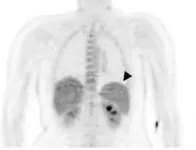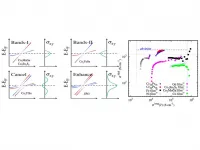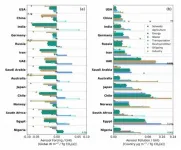(Press-News.org) Observational studies have suggested that increased vitamin D levels may protect against COVID-19. However, these studies were inconclusive and possibly subject to confounding. A study published in PLOS Medicine by Guillaume Butler-Laporte and Tomoko Nakanishi at McGill University in Quebec, Canada, and colleagues suggests that genetic evidence does not support vitamin D as a protective measure against COVID-19.
The ability of vitamin D to protect against severe COVID-19 illness is of great interest to public health experts, but has limited supporting evidence. To assess the relationship between vitamin D levels and COVID-19 susceptibility and severity, researchers conducted a Mendelian randomization study using genetic variants strongly associated with increased vitamin D levels. The authors analyzed genetic variants of 4,134 individuals with COVID-19, and 1,284,876 without COVID-19, from 11 countries to determine whether genetic predisposition for higher vitamin D levels were associated with less-severe disease outcomes in people with COVID-19.
The results showed no evidence for an association between genetically predicted vitamin D levels and COVID-19 susceptibility, hospitalization, or severe disease, suggesting that raising circulating vitamin D levels through supplementation may not improve COVID-19 outcomes in the general population. However, the study had several important limitations, including that the research did not include individuals with vitamin D deficiency, and it remains possible that truly deficient patients may benefit from supplementation for COVID-19 related protection and outcomes. Additionally, the genetic variants were obtained only from individuals of European ancestry, so future studies will be needed to determine the relationship with COVID-19 outcomes in other populations.
According to the authors, "Vitamin D supplementation as a public health measure to improve outcomes is not supported by this study. Most importantly, our results suggest that investment in other therapeutic or preventative avenues should be prioritized for COVID-19 randomized clinical trials".
Dr. Butler-Laporte notes, "Most vitamin D studies are very difficult to interpret since they cannot adjust for the known risk factors for severe Covid-19 (e.g. older age, institutionalization, having chronic diseases) which are also predictors of low vitamin D. Therefore, the best way to answer the question of the effect of vitamin D would be through randomized trials, but these are complex and resource intensive, and take a long time during a pandemic. Mendelian randomization can provide more clear insights into the role of risk factors like vitamin D because they can decrease potential bias from associated risk factors like institutionalization and chronic disease. In the past Mendelian randomization has consistently predicted results of large, expensive, and timely vitamin D trials. Here, this method does not show clear evidence that vitamin D supplementation would have a large effect on Covid-19 outcomes."
INFORMATION:
Research Article
Peer reviewed; Observational study; Humans
In your coverage please use this URL to provide access to the freely available paper:
http://journals.plos.org/plosmedicine/article?id=10.1371/journal.pmed.1003605
Funding: The Richards research group is supported by the Canadian Institutes of Health Research (CIHR: 365825; 409511), the Lady Davis Institute of the Jewish General Hospital, the Canadian Foundation for Innovation, the NIH Foundation, Cancer Research UK, Genome Québec, the Public Health Agency of Canada and the Fonds de Recherche Québec Santé (FRQS). GBL is supported by the CIHR, and a joint scholarship from the FRQS and Québec's Ministry of Health and Social Services. TN is supported by Research Fellowships of Japan Society for the Promotion of Science (JSPS) for Young Scientists and JSPS Overseas Challenge Program for Young Researchers. JBR is supported by a FRQS Clinical Research Scholarship. Support from Calcul Québec and Compute Canada is acknowledged. TwinsUK is funded by the Welcome Trust, Medical Research Council, European Union, the National Institute for Health Research (NIHR)-funded BioResource, Clinical Research Facility and Biomedical Research Centre based at Guy's and St Thomas' NHS Foundation Trust in partnership with King's College London. VM is supported by the Canada Excellence Research Chair Program. The funders had no role in study design, data collection and analysis, decision to publish, or preparation of the manuscript.
Competing Interests: I have read the journal's policy and the authors of this manuscript have the following competing interests: JBR has served as an advisor to GlaxoSmithKline and Deerfield Capital. These companies had no role in the design, implementation, or interpretation of this study. No other authors have competing interests.
Citation: Butler-Laporte G, Nakanishi T, Mooser V, Morrison DR, Abdullah T, Adeleye O, et al. (2021) Vitamin D and COVID-19 susceptibility and severity in the COVID-19 Host Genetics Initiative: A Mendelian randomization study. PLoS Med 18(6): e1003605. https://doi.org/10.1371/journal.pmed.1003605
A nationwide study in Sweden estimates the elevated risk of advanced or fatal prostate cancer among relatives of men with the disease, providing new data that could help refine guidelines for the age at which screening should begin. Mahdi Fallah and Elham Kharazmi of the German Cancer Research Center (DKFZ) in Heidelberg, Germany, and colleagues present these new findings in the open-access journal PLOS Medicine.
Clinical guidelines for the age to start prostate cancer screening aim to ensure that the benefits of identifying the disease early ...
The malaria parasite Plasmodium vivax may accumulate in the spleen soon after infection to a greater extent than its better-known relative P. falciparum, according to new research published by John Woodford of the University of Queensland, Brisbane, Australia and colleagues in the open access journal PLOS Medicine.
Managing and treating P. vivax and P. falciparum infections calls for investigation of their different pathways of infection, and our limited understanding of disease pathology has generally relied on indirect and imprecise approaches. Woodford and colleagues studied 7 healthy participants who were infected under controlled conditions with either P. vivax or P. falciparum. They underwent a Positron Emission Tomography (PET) ...
Many organisms in need of conservation are still unknown or lumped in with similar species, which potentially interferes with conservation efforts. In a new study published June 1 in the Open Access journal PLOS Biology, Jane Melville of Museums Victoria, and her colleagues present a new "return-on-investment" approach to best direct efforts to identify new species before they are lost.
Humans have had a profoundly destructive impact on global biodiversity. However, this loss of biodiversity may be even greater than scientists have realized, due to the unknown number of undocumented species. Before a species and its habitat can be preserved, though, it must first ...
Stigma and high care needs can present barriers to the provision of high-quality primary care for people with opioid use disorder (OUD) and those prescribed opioids for chronic pain. A study published in PLOS Medicine by Tara Gomes at the Li Ka Shing Knowledge Institute of St. Michael's Hospital, Toronto, Canada and colleagues suggests that people treated for an opioid use disorder were less likely to find a new primary care provider (PCP) within one year of termination of enrolment with the previous physician.
People with substance use disorders often have complex medical needs, requiring ...
A new analysis of adults aged 80 years and older shows that a healthier lifestyle is associated with a lower risk of cognitive impairment, and that this link does not depend on whether a person carries a particular form of the gene APOE. Xurui Jin of Duke Kunshan University in Jiangsu, China, and colleagues present these findings in the open-access journal PLOS Medicine.
The APOE gene comes in several different forms, and people with a form known as APOE ε4 have an increased risk of cognitive impairment and Alzheimer's disease. Previous research has also linked cognitive function to lifestyle factors, such as smoking, ...
Malaria, a disease caused mainly by the parasites Plasmodium falciparum and Plasmodium vivax, (P. vivax) is associated with over 400,000 deaths each year. Previously, the spleen was assumed to mostly play a role in parasite destruction, as it eliminates malaria parasites after antimalarial treatment. A study published in the open access journal PLOS Medicine by Steven Kho and Nicholas Anstey at Menzies School of Health Research, Australia, and international colleagues, suggests that in chronic P. vivax infections, malaria parasites survive and replicate via a previously undetected lifecycle within the spleen.
A large biomass of intact asexual-stage ...
A clinical trial examining the efficacy of two devices to monitor and detect atrial fibrillation (AF), or an irregular heartbeat, in ischemic stroke patients--one an implantable device that monitors over 12 months, the other an external device that monitors over a 30-day period--found the implantable device is more than three times more effective in detecting AF, and both are a significant improvement over the current standard of care in Alberta, Canada.
The Post-Embolic Rhythm Detection With Implantable Versus External Monitoring (PER DIEM) study, led jointly by University of Alberta ...
The electronic structure of metallic materials determines the behavior of electron transport. Magnetic Weyl semimetals have a unique topological electronic structure - the electron's motion is dynamically linked to its spin. These Weyl semimetals have come to be the most exciting quantum materials that allow for dissipationless transport, low power operation, and exotic topological fields that can accelerate the motion of the electrons in new directions. The compounds Co3Sn2S2 and Co2MnGa [1-4], recently discovered by the Felser group, have shown some of the most prominent effects due to a set of two topological bands.
Researchers at the Max Planck Institute ...
Aerosol reductions that would take place as countries meet climate goals could contribute to global cooling and prevent more than one million annual premature deaths over a decade, according to a new study from the University of California San Diego.
The landmark Paris Agreement of 2016 does not address emissions of aerosols--fine particulates like soot that cause pollution. Nonetheless, findings from the recent study authored by researchers at UC San Diego's Scripps Institution of Oceanography and the School of Global Policy and Strategy suggests that aerosol accounting should be explicitly incorporated into international climate policy.
It is crucial because as countries implement their greenhouse gas reduction targets under the Paris climate agreement, ...
BOSTON - For patients who have experienced certain common types of stroke, a small chip inserted under the skin may help physicians predict their likelihood of experiencing a second stroke, and therefore their likelihood of benefiting from preventive therapy. The findings come from a recent clinical trial published in the END ...




